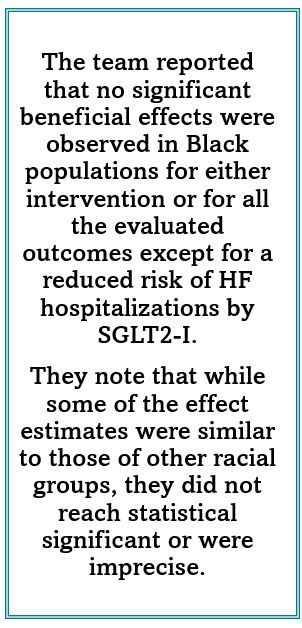- Clinical Technology
- Adult Immunization
- Hepatology
- Pediatric Immunization
- Screening
- Psychiatry
- Allergy
- Women's Health
- Cardiology
- Pediatrics
- Dermatology
- Endocrinology
- Pain Management
- Gastroenterology
- Infectious Disease
- Obesity Medicine
- Rheumatology
- Nephrology
- Neurology
- Pulmonology
GLP-1 Mimetics, SGLT-2 Inhibitors Understudied in Black Populations in Pivotal Trials, Benefits Questioned
Pivotal cardiovascular outcome trials that evaluated cardiorenal benefits of the newer classes were not designed to consider racial/ethnic variations, researchers state.
Substantial racial and ethnic differences in the cardiorenal effects of sodium-glucose co-transporter 2 inhibitors (SGLT2-Is) and glucagon-like peptide 1 receptor agonists (GLP1-RAs) among individuals with type 2 diabetes (T2D) have been revealed by a new systematic review and meta-analysis of pivotal cardiovascular outcome trials (CVOT).1
Among the findings were “consistent benefits observed among White and Asian populations and consistent lack of benefits in Black populations,” wrote investigators from the Diabetes Research Centre, University of Leicester, Leicester General Hospital, Leicester UK.1
The study was published online September 21, 2023, in the Journal of the Royal Society of Medicine.
“Given the well-documented evidence that Black and other ethnic minority populations are more likely to develop type 2 diabetes and at a younger age, the consistent lack of benefits we observed among Black populations is concerning,” lead researcher Professor Samuel Seidu, professor in primary care diabetes and cardio-metabolic medicine at the University of Leicester, said in a press statement.2 “Minimising racial and ethnic variations in the cardiovascular and renal complications of type 2 diabetes requires targeted improved access to care and treatment for those most at risk.”2
“Given the well-documented evidence that Black and other ethnic minority populations are more likely to develop type 2 diabetes and at a younger age, the consistent lack of benefits we observed among Black populations is concerning.”
Little is known, Seidu and colleagues assert, about the relative efficacy of the newer antihyperglycemic medications, ie, GLP-1RAs, SGLT-2i, across racial and ethnic groups. The US Food and Drug Administration-mandated CVOTs on which cardio- and renoprotective indications were based were not originally designed to consider racial/ethnic variations, they point out.
The purpose of their study was to learn more about relative benefits and harms across these groups, focusing particularly on CV and renal outcomes. Specifically, the systematic meta-analysis of CVOTs compared racial/ethnic and regional patterns in the CV and renal safety and efficacy of GLP-1RAs and SGLT2-Is.
Methods, outcomes
The investigators identified studies in MEDLINE, Embase, and the Cochrane Library from inception to July 7, 2023, using a randomized controlled trial filter. Studies eligible for analysis were randomized, placebo-controlled CVOTs of SGLT2-Is or GLP1-RAs in patients with T2D, which have reported data on cardiovascular and/or renal outcomes by race/ethnicity and/or region of participants.
They defined primary outcomes as:
- major adverse cardiovascular events (MACE) or composite of death from cardiovascular causes, non-fatal myocardial infarction, or non-fatal stroke (composite cardiovascular outcome)
- composite outcome of CVD death/heart failure (HF) hospitalization
- composite outcome of end-stage kidney disease, doubling of creatinine level or death from renal causes (composite renal outcome)
- all-cause mortality
Secondary outcomes were individual components of each composite as well as adverse events.
FINDINGS
From an original 466 potentially relevant citations and after full-text evaluation of 31 articles, there were 14 unique randomized placebo controlled CVOTs (7 each comparing SGLT2-Is and GLP-1 RAs) included in the final review.
All participants were diagnosed with T2D (mean duration , 9.3 to 15.8 years) and were managed prior to trial entry on standard therapies including background antihyperglycemic and antihypertensive agents. Participants mean age ranged from 60 to 69 years, according to the study and mean/median trial follow-up ranged from 9 months to 3.8 years.

Underrepresentation
Seidu et al reported the following ranges in proportion of racial/ethnic groups across final studies: White 66.6% to 93.2%; Black 2.4% to 8.3%; Asian 1.2% to 21.6%; and 0.9% to 23.1% for Other populations.
The HR (95% CI) for MACE comparing SGLT2-Is vs placebo was 0.92 (0.86-0.98) for White, 0.69 (0.53-0.92) for Asian, and 0.70 (0.54-0.91) for Hispanic/Latino populations.
Comparing GLP1-RAs vs placebo, the corresponding values were 0.88 (0.80-0.97), 0.76 (0.63-0.93) and 0.82 (0.70-0.95), respectively. SGLT2-Is reduced the risk of all other cardiorenal outcomes in White and Asian populations, except for HF hospitalizations in Asians.
The team reported that no significant beneficial effects were observed in Black populations for either intervention or for all the evaluated outcomes except for a reduced risk of HF hospitalizations by SGLT2-I. They note that while some of the effect estimates were similar to those of other racial groups, they did not reach statistical significant or were imprecise.
The researchers conclude on an inconclusive note, saying “Whether the differences are due to issues with under-representation of Black populations and low statistical power or racial/ethnic variations in the pharmacokinetics, pharmacodynamics and safety of SGLT2-Is and GLP1-RAs need further investigation.” They urge clinicians not to deny the newer agents to Black populations “on the back of this research.”
References
1. Kunutsor SK, Khunti K, Seidu S. Racial, ethnic and regional differences in the effect of sodium-glucose co-transporter 2 inhibitors and glucagon-like peptide 1 receptor agonists on cardiovascular and renal outcomes: a systematic review and meta-analysis of cardiovascular outcome trials. J R Soc Med. Published online September 21, 2023. doi.org/10.1177/01410768231198442.
2. Newer diabetes treatments are understudied in Black populations and may be less beneficial. News release. The Royal Society of Medicine. September 22, 2023. Accessed September 25, 2023. https://www.rsm.ac.uk/media-releases/2023/newer-diabetes-treatments-are-understudied-in-black-populations-and-may-be-less-beneficial/
Obesity Linked to Faster Alzheimer Disease Progression in Longitudinal Blood Biomarker Analysis
December 2nd 2025Biomarker trajectories over 5 years in study participants with AD show steeper rises in pTau217, NfL, and amyloid burden among those with obesity, highlighting risk factor relevance.
